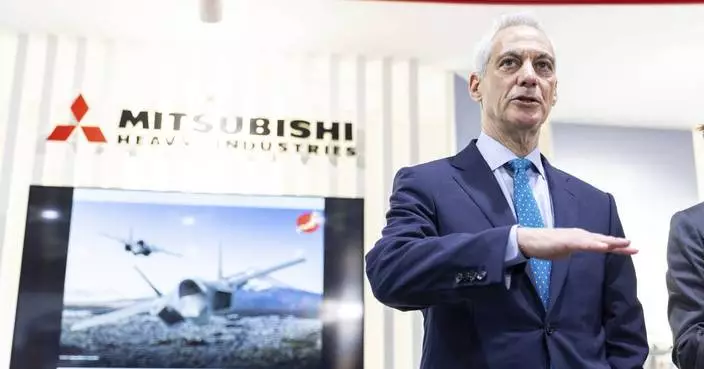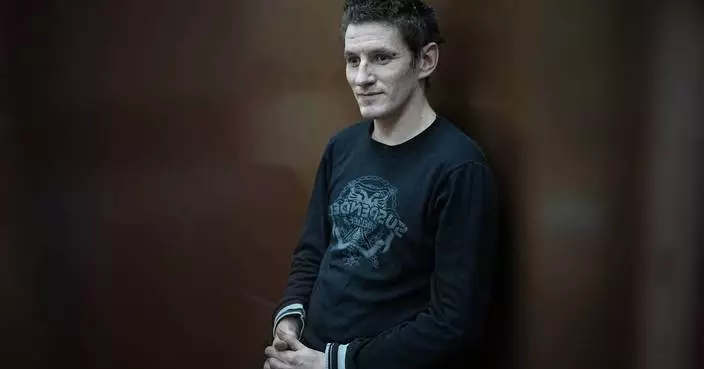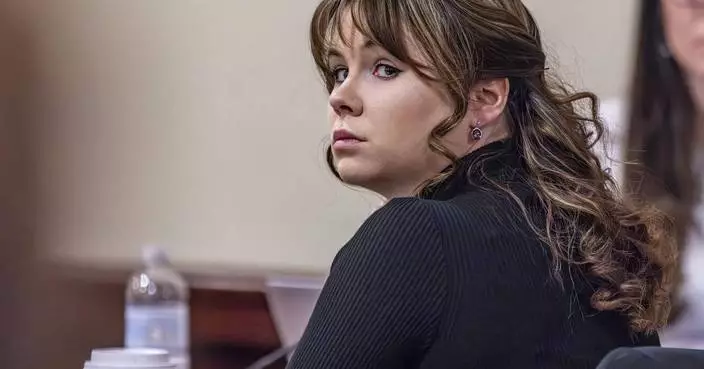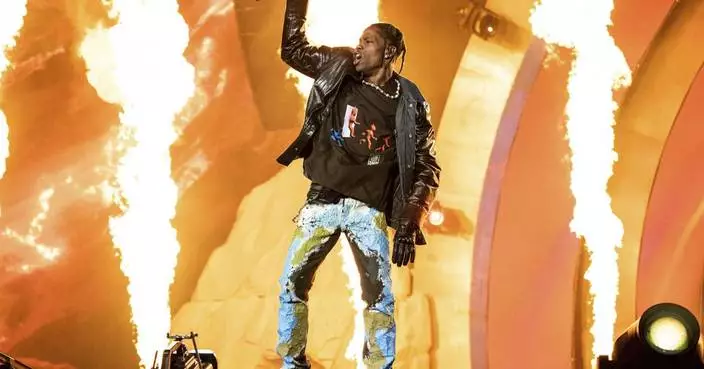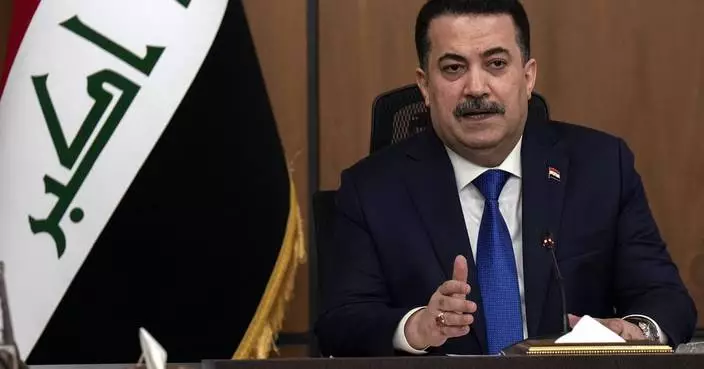Some advice to all the parents out there, particularly those swept up in the soaring passion and tear-jerking emotion of the Olympics.
If your children dream of going for a gold medal someday, you might want to nudge them in a different direction.
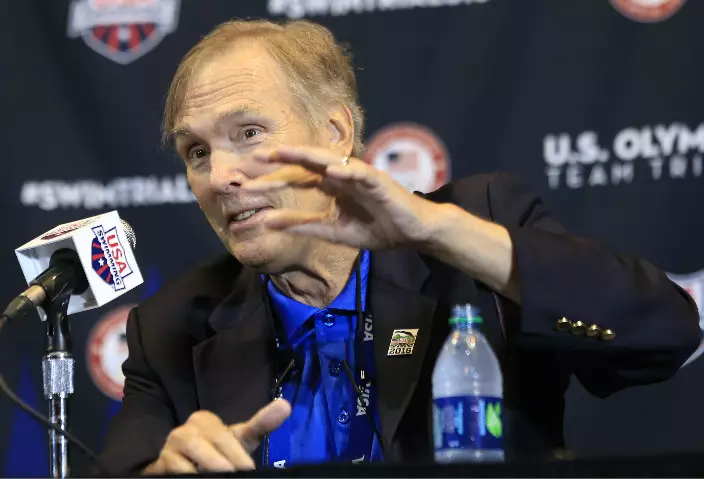
In this June 24, 2016, file photo, Chuck Wielgus, executive director of USA Swimming, answers a reporter's question during a news conference at the U.S. Olympic team trials in Omaha, Neb. USA Swimming and longtime executive director Wielgus, who apologized to victims of sexual abuse, maintained control over the day-to-day operations right up until his death in April from colon cancer. (AP Photo/Orlin Wagner, File)
At the very least, it's time to have a serious talk about the very real dangers they could face along the way.
Because this much is clear: The folks who run the U.S. Olympic movement have largely failed when it comes to protecting our young athletes from predators and perverts, and there's not much reason to believe this intolerable situation will improve without a total shake-up.
Right in the midst of the Winter Games, with hardly enough time for Larry Nassar to settle into the prison cell where he'll be spending the rest of his life, we got another report detailing horrific abuse and shameful cover-ups within one of the most high-profile summer sports.
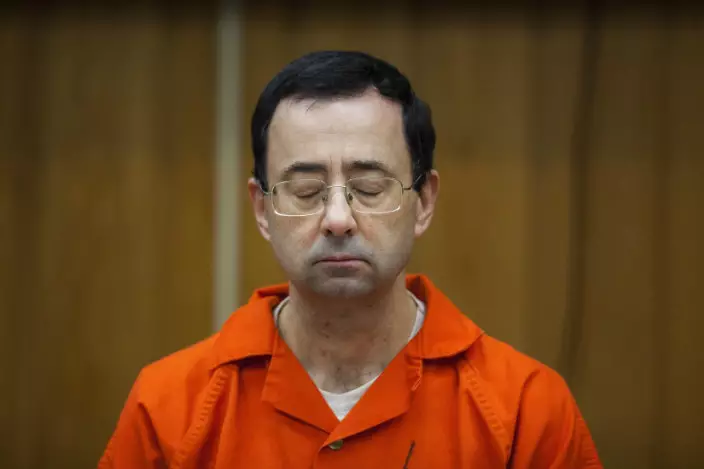
In this Feb. 5, 2018, file photo, Larry Nassar listens during his sentencing at Eaton County Circuit Court in Charlotte, Mich. Right in the midst of the Pyeongchang Games, with hardly enough time for Larry Nassar to settle into the prison cell where he'll be spending the rest of his life, we got another report detailing horrific abuse and shameful cover-ups within one of the most high-profile summer sports. (Cory Morse/The Grand Rapids Press via AP, File)
The Southern California News Group conducted an extensive investigation that found USA Swimming repeatedly balked at overhauling a culture in which "the sexual abuse of underage swimmers by their coaches and others in positions of power within the sport was commonplace and even accepted by top officials and coaches," resulting in hundreds of young victims.
If all that sounds familiar, it should.
This issue has been a stain on swimming for years now, rearing its ugly head again recently when 2012 Olympian Ariana Kukors accused former coach Sean Hutchison of grooming her beginning at the age of 13 for what became an underage sexual relationship. Hutchison denied the claims.
Of course, we're still trying to process how hundreds of young gymnasts could be molested by Nassar under the guise of medical care, while USA Gymnastics largely looked the other way. Thankfully, the disgraced sports doctor has been locked away for good, but the long list of victims — including several gold medalists — are left to cope with their own life sentences.
"The Olympic system failed you, and we are so incredibly sorry," U.S. Olympic Committee chairman Larry Probst said shortly before the flame was lit in Pyeongchang.
To its credit, the USOC has taken some positive steps.
It launched the U.S. Center for SafeSport, which is responsible for investigating all abuse cases involving Olympic athletes.
It forced out the leadership at USA Gymnastics.
"We think that we did what we were supposed to do," Probst said. "Could we have done more? Of course. You can always do more."
Indeed, the USOC could've done more, should've done more.
Yet with each passing day, it becomes more and more difficult to believe that those currently in charge are capable of such a monumental change in action and attitude.
The latest report certainly raises new questions about the USOC failing to take any meaningful steps against USA Swimming and longtime executive director Chuck Wielgus , who maintained control over the day-to-day operations right up until his death in April from cancer.
Speedskating dealt with its own sexual abuse scandal a few years ago . Andy Gabel, a four-time U.S. Olympian in short track, was accused of having improper sexual relationships with two underage skaters, leading to his resignation from leadership positions within both the U.S. and international governing bodies.
Incredibly, though, Gabel remains a member of the National Speedskating Hall of Fame.
That is yet another slap in the face to those who have suffered, and another unmistakable sign that those in power refuse to comprehend the depth of the problem — or just don't care.
The USOC stands at the top of a complex web, but it has always been hesitant about reining in the more than 40 sports organizations it oversees, known as national governing bodies (NGBs).
That has led to a baffling range of policies for dealing with emotional, physical and sexual abuse, almost certainly guaranteeing that the next scandal is right around the corner.
If it can happen in swimming and gymnastics, just imagine how easy it would be for a sexual predator lurking in a lower-profile sport to wreak untold misery.
Probst acknowledged that the hands-off approach to the NGBs must change.
"Right now, they are independent institutions that have their own board of directors, their own management teams, their own revenue-generating machines," he said. "But clearly some things have occurred that would indicate we need to have a different relationship than we may have had in the past."
Of course, one must wonder why it took so long to recognize such an obvious flaw in the system.
It's easy to see the reasoning of those who want the USOC to clean house, a demand being pushed by two U.S. senators and former Olympic swimmer and activist Nancy Hogshead-Makar, whose group includes 17 other Olympians.
In particular, they have a bulls-eye on CEO Scott Blackmun.
"We've done a lot of things," Probst said while defending Blackmun, "but clearly more needs to be done."
In the meantime, parents, you might want to put a damper on your kids' Olympic dreams.
Their safety comes first.
TOKYO (AP) — The United States ambassador to the United Nations said Thursday that America will stand with Japan until all the Japanese abducted by North Korea decades ago return home to end their painful separation.
Linda Thomas-Greenfield made the comments on Thursday as she began her visit to Tokyo by meeting with the families of those kidnapped.
Japan says North Korea abducted at least 17 Japanese citizens, possibly many more, to train them as agents during the 1970s and 1980s. After admitting in 2002 it had abducted 13 Japanese, North Korea apologized and allowed five to return home for a visit. They have since stayed in Japan. Pyongyang said eight others had died and denied that the other four entered its territory and never provided a reinvestigation it has promised.
The twelve who are still missing include teenage students and others living along Japan’s coasts. Many were bundled into small boats and taken across the sea to North Korea.
“The United Stats stands with all the families, with all of Japan and with the international community in pressing for a resolution that will allow all families separated by the regime’s policies to be reunited,” Thomas-Greenfield said at the outset of her meeting with five relatives of the abductees and a representative from their support group at the Prime Minister’s Office.
“I’m all too familiar with the pain and the loss and the suffering that you family members here are experiencing,” she said. “I know how painful it is for you, and then how long you have had to endure this pain.”
Thomas-Greenfield said she has worked on North Korea-related issues throughout her career.
U.S. President Joe Biden’s administration is committed to raising the abduction issue “at every opportunity and calling for the return of abducted Japanese citizens to their family,” the ambassador said, adding that America sticks to that policy regardless of the leadership.
Japanese Prime Minister Fumio Kishida has repeatedly stated his determination to hold a summit with North Korean leader Kim Jong Un to achieve the return of the abductees.
Experts say Kim wants improved ties with Japan to drive a wedge between the United States and its allies, while Kishida, stung by a major corruption scandal in his governing party, wants to use possible progress in the abduction issue to turn around his dwindling support ratings at home. They say a summit, however, would be difficult because Japan cannot accept the preconditions set by Pyongyang in order to resolve the abduction issues.
Sakie Yokota, 88, whose then-13-year-old daughter, Megumi, was abducted in 1977 from Japan’s northern coast on her way home from school, told Thomas-Greenfield that she, her husband and Megumi’s brothers searched for her for 20 years until they found out she was abducted. They are still waiting to reunite with her, she said.
“All I want is to see her, while I’m still well,” Yokota said, beseeching the ambassador for continued support toward resolving the problem.
Thomas-Greenfield arrived in Tokyo after her earlier visit to Seoul, where she and South Korean officials discussed a new mechanism for monitoring North Korea’s nuclear weapons program. Russia and China have thwarted U.S.-led efforts to step up U.N. sanctions on North Korea over its ballistic missile testing since 2022, underscoring a deepening divide between permanent Security Council members over Russia’s war on Ukraine.
The United States, South Korea and Japan have been deepening security ties amid growing tensions in the region from North Korea and China. The three countries have expanded their combined military exercises and their deterrence strategies built around U.S. strategic assets.
Associated Press writer Kim Tong-hyung in Seoul, South Korea, contributed to this report.
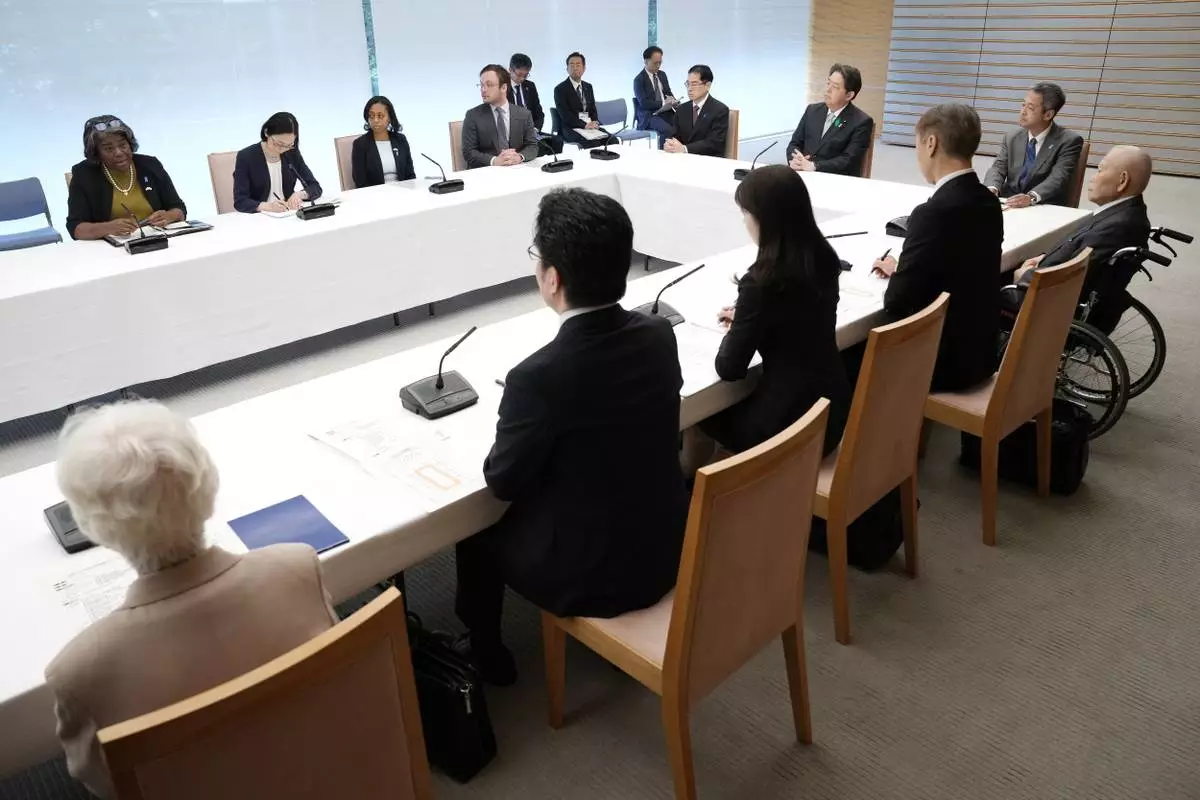
U.S. Ambassador to United Nations Linda Thomas-Greenfield, top left, meets with Japan's Chief Cabinet Secretary Yoshimasa Hayashi, far right, and the families of abduction victims by North Korea Thursday, April 18, 2024, at prime minister's office in Tokyo. (AP Photo/Eugene Hoshiko, Pool)
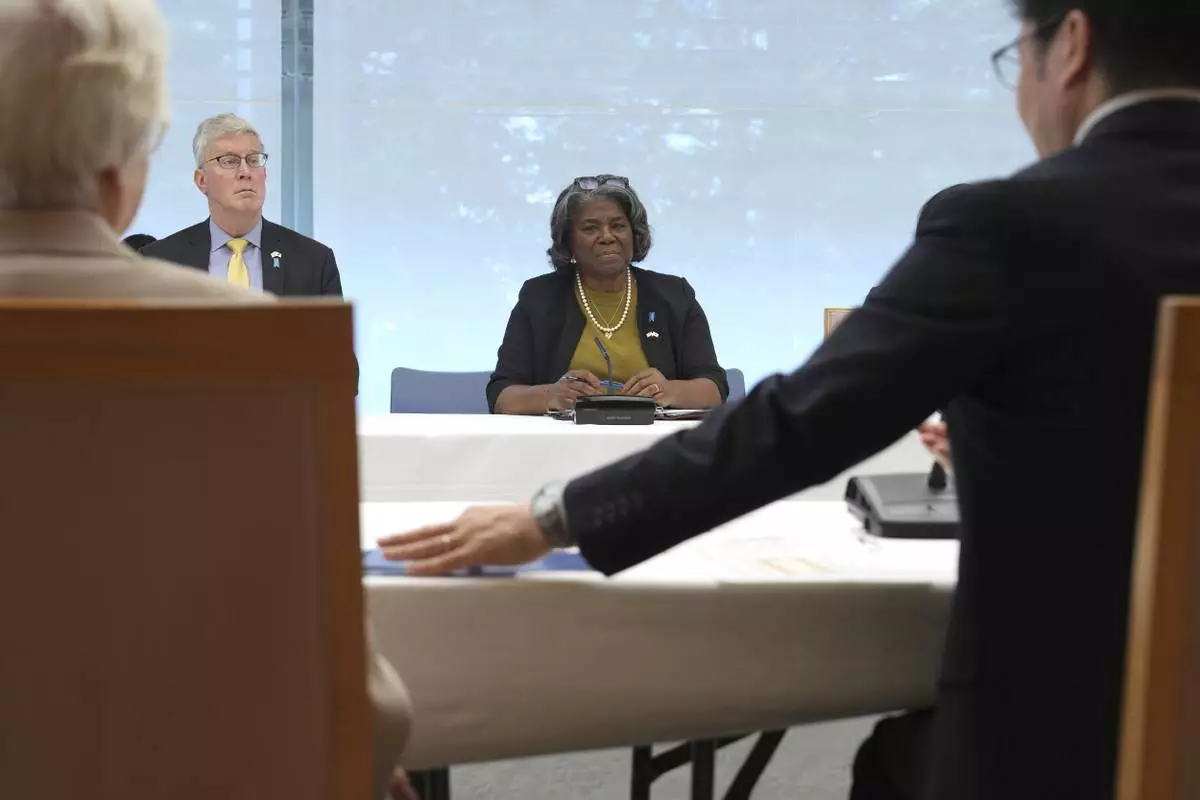
U.S. Ambassador to United Nations Linda Thomas-Greenfield, center, meets with the families of abduction victims by North Korea Thursday, April 18, 2024, at prime minister's office in Tokyo. (AP Photo/Eugene Hoshiko, Pool)
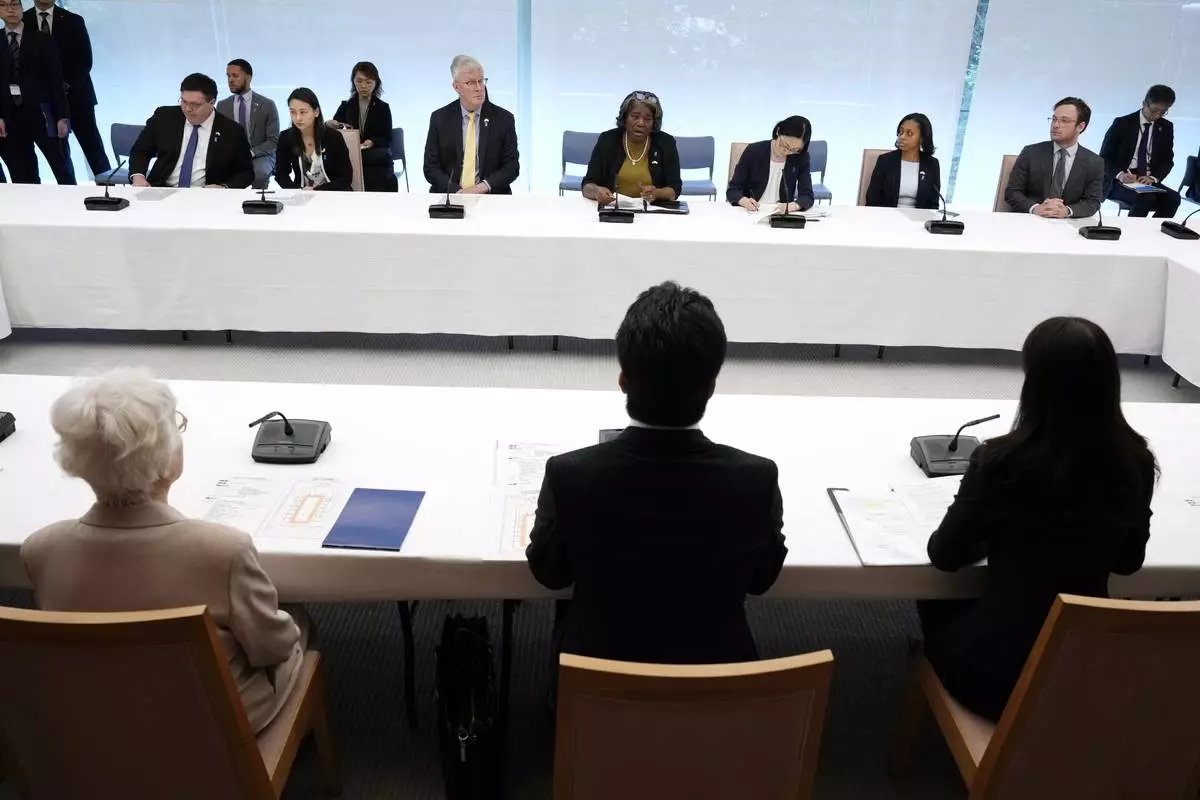
U.S. Ambassador to United Nations Linda Thomas-Greenfield, center top, meets with Japan's Chief Cabinet Secretary Yoshimasa Hayashi and the families of abduction victims by North Korea Thursday, April 18, 2024, at prime minister's office in Tokyo. (AP Photo/Eugene Hoshiko, Pool)
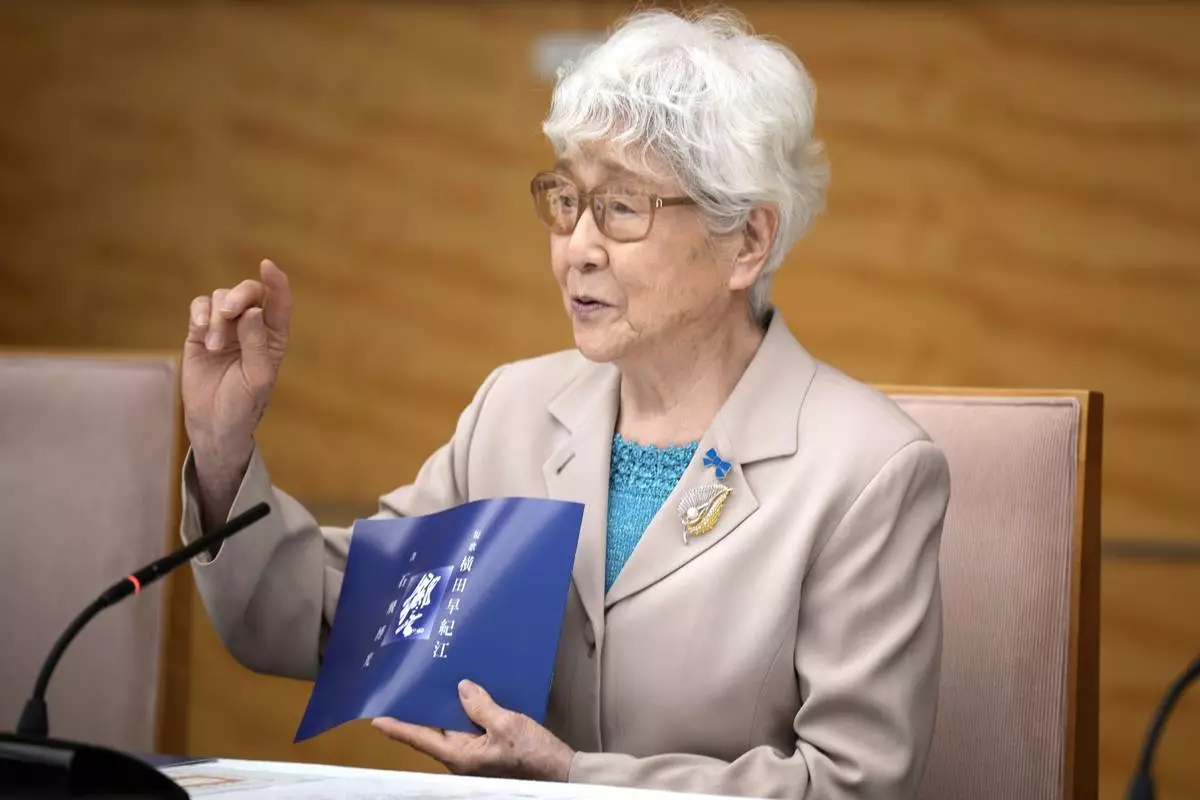
Sakie Yokota, mother of Megumi Yokota, one of the Japanese abductees by North Korea, speaks to U.S. Ambassador to United Nations Linda Thomas-Greenfield on Thursday, April 18, 2024, at prime minister's office in Tokyo. (AP Photo/Eugene Hoshiko, Pool)
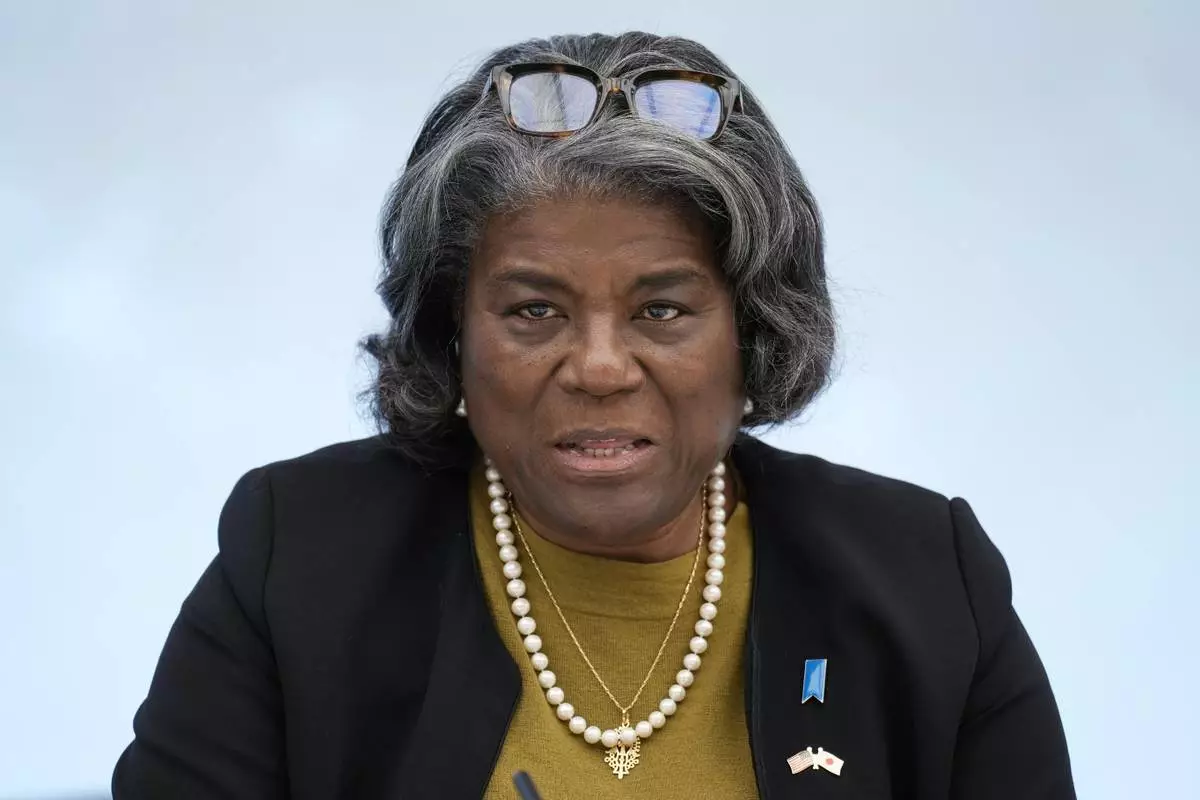
U.S. Ambassador to United Nations Linda Thomas-Greenfield speaks with Japan's Chief Cabinet Secretary Yoshimasa Hayashi and the families of abduction victims by North Korea on Thursday, April 18, 2024, at prime minister's office in Tokyo. (AP Photo/Eugene Hoshiko, Pool)
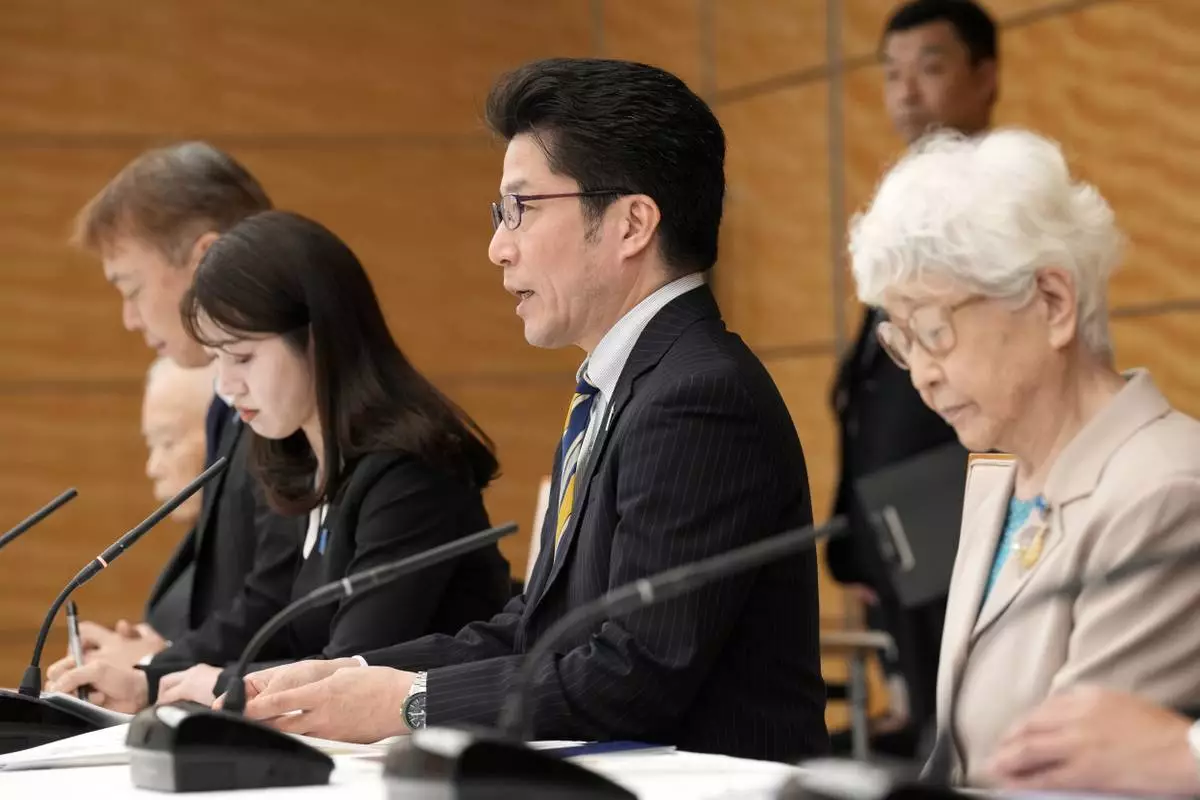
Takuya Yokota, Secretary-General of the Association of Families of Victims Kidnapped by North Korea, center, speaks to U.S. Ambassador to United Nations Linda Thomas-Greenfield, not in picture on Thursday, April 18, 2024, at prime minister's office in Tokyo. (AP Photo/Eugene Hoshiko, Pool)
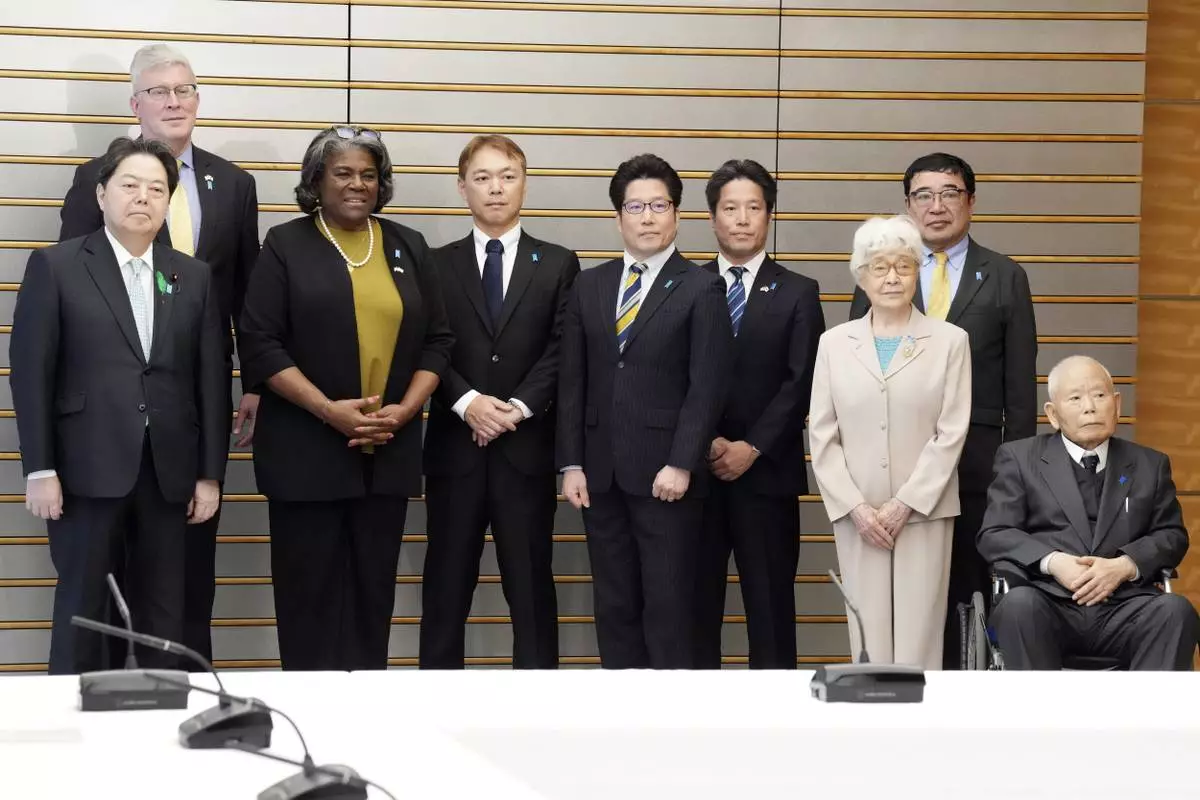
U.S. Ambassador to United Nations Linda Thomas-Greenfield, third from left, poses for a photo with Japan's Chief Cabinet Secretary Yoshimasa Hayashi, left, and the families of abduction victims by North Korea on Thursday, April 18, 2024, at prime minister's office in Tokyo. (AP Photo/Eugene Hoshiko, Pool)
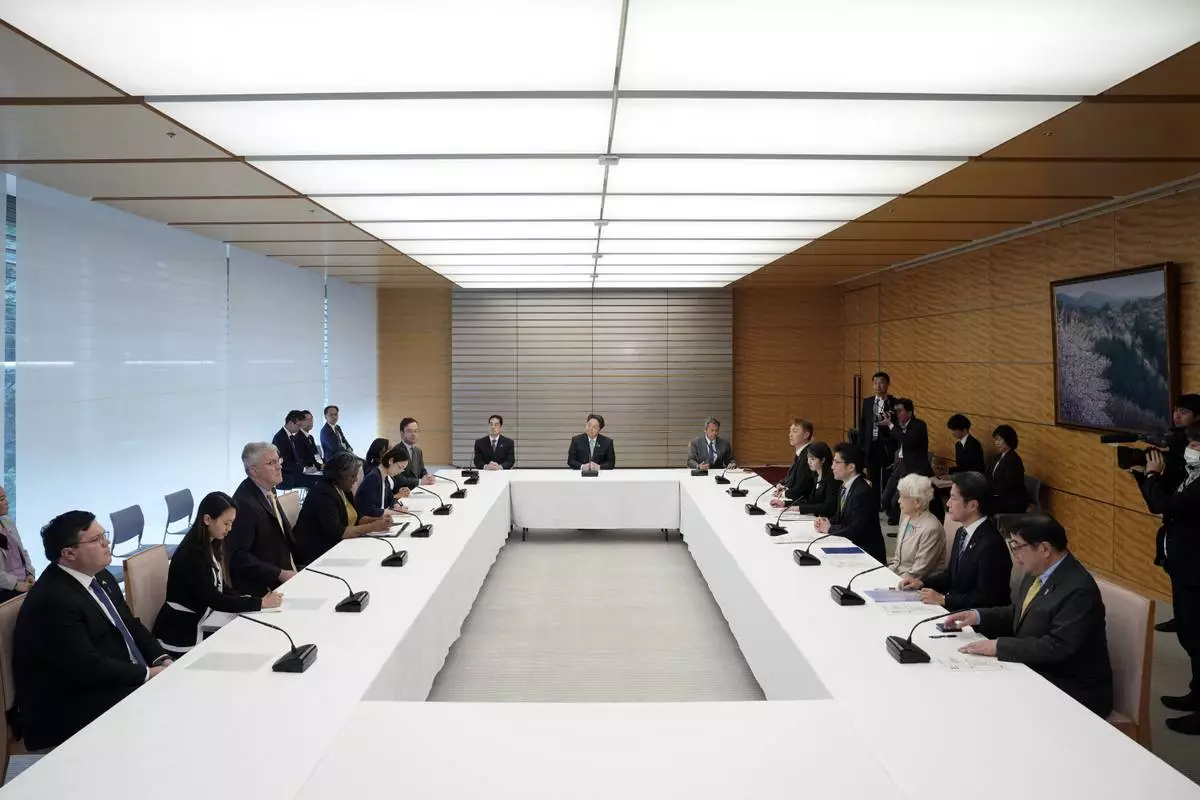
U.S. Ambassador to United Nations Linda Thomas-Greenfield, fourth left, meets with Japan's Chief Cabinet Secretary Yoshimasa Hayashi, center top, and the families of abduction victims by North Korea Thursday, April 18, 2024, at prime minister's office in Tokyo in Tokyo. (AP Photo/Eugene Hoshiko, Pool)
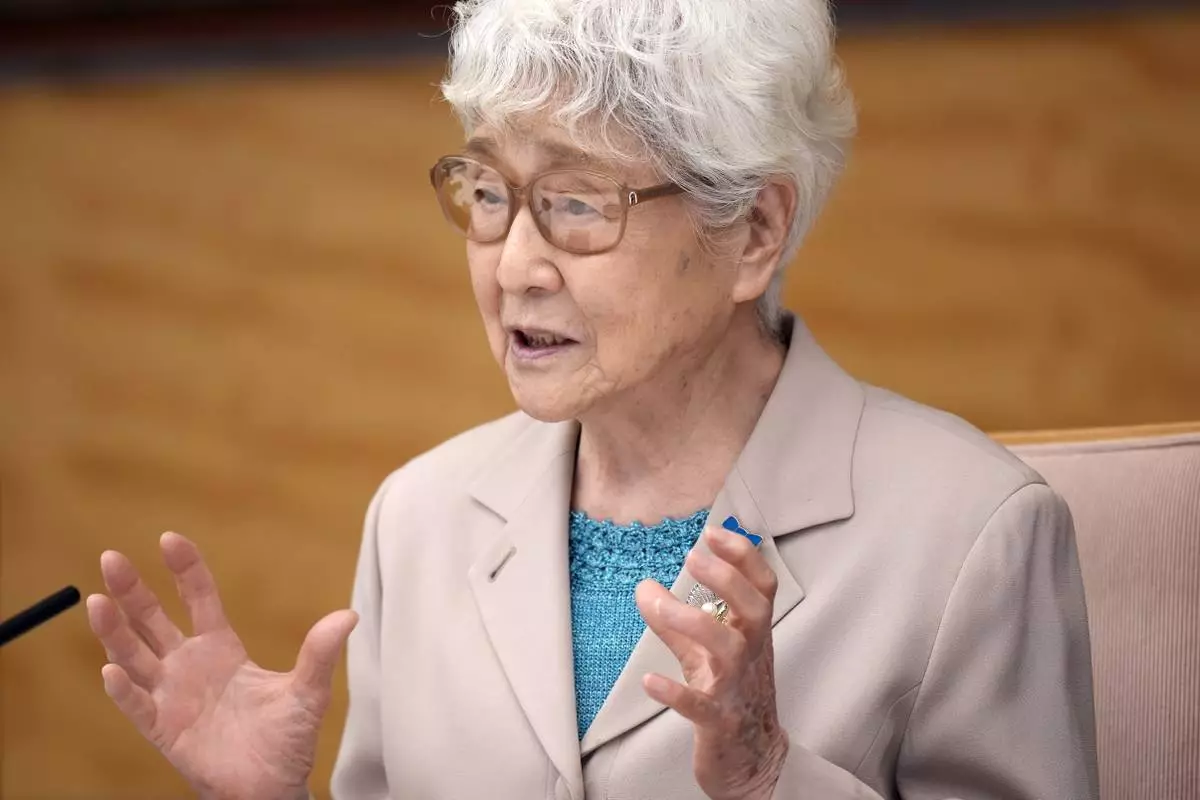
Sakie Yokota, mother of Megumi Yokota, one of the Japanese abductees by North Korea, speaks to U.S. Ambassador to United Nations Linda Thomas-Greenfield, not in picture, on Thursday, April 18, 2024, at prime minister's office in Tokyo. (AP Photo/Eugene Hoshiko, Pool)
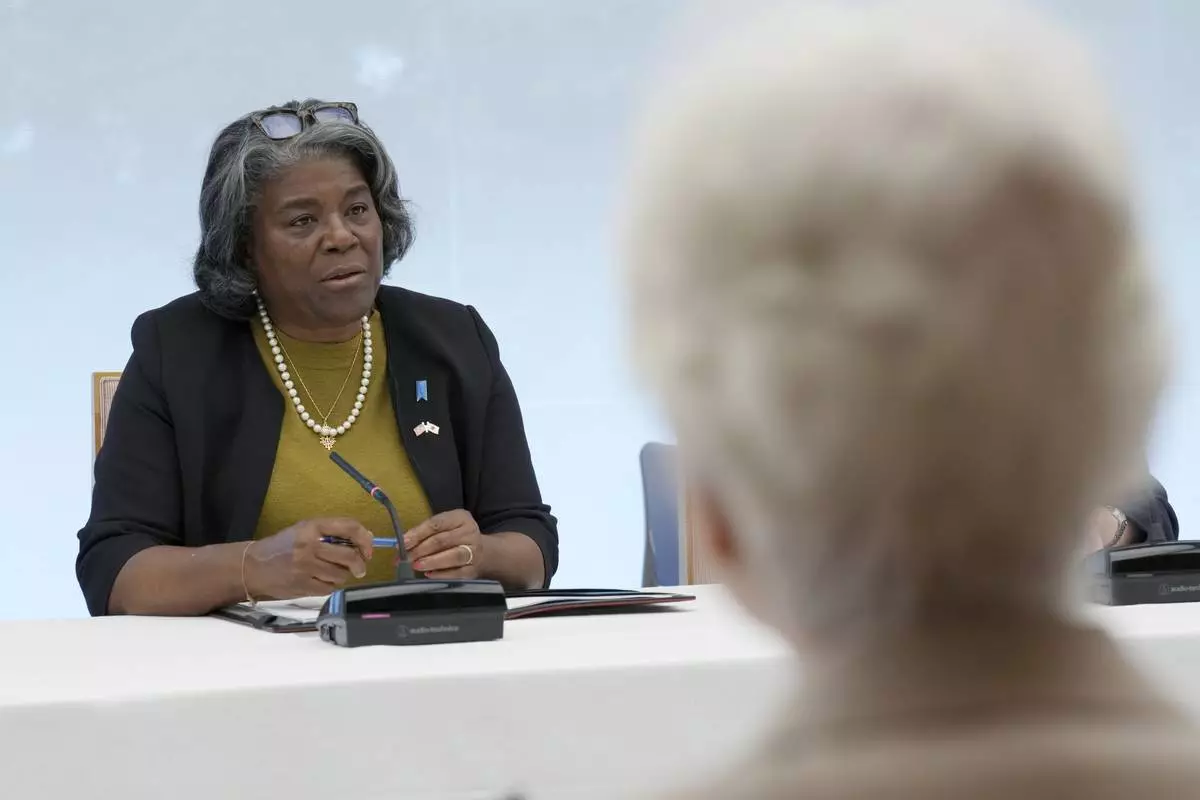
U.S. Ambassador to United Nations Linda Thomas-Greenfield meets with the families of abduction victims by North Korea Thursday, April 18, 2024, at prime minister's office in Tokyo in Tokyo. (AP Photo/Eugene Hoshiko, Pool)

















